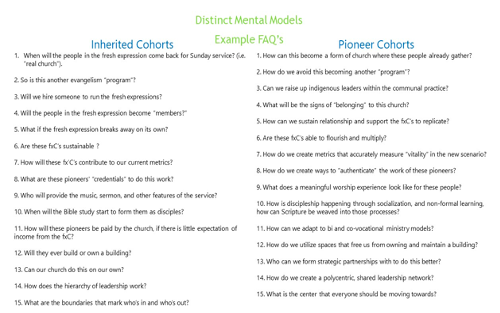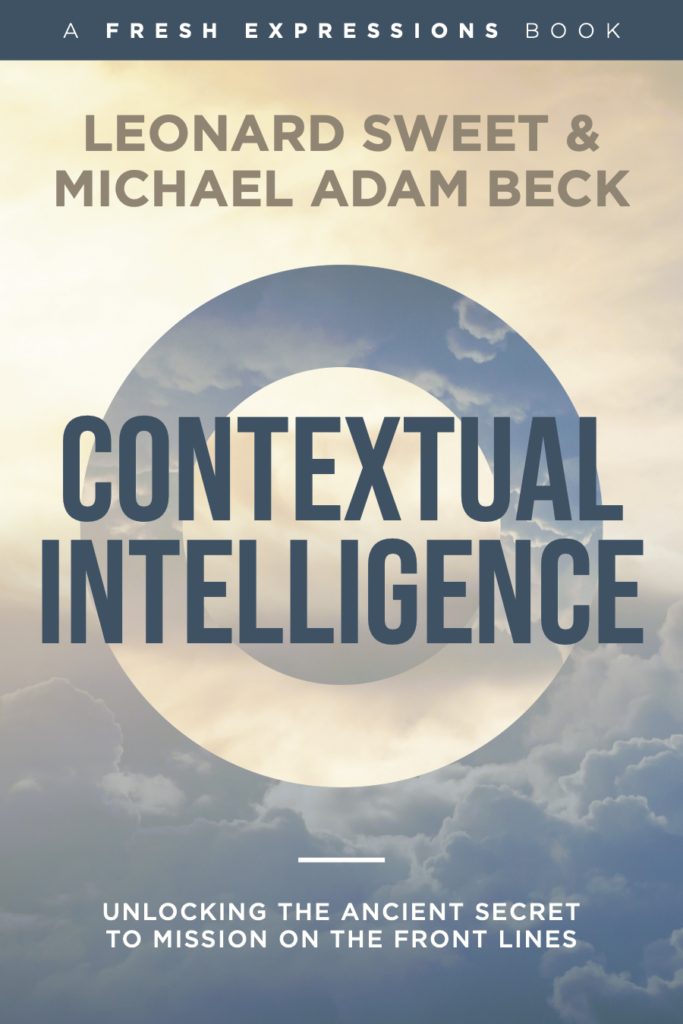The #1 Competency Pioneer Leaders Need Today
This is part one of a series of posts highlighting the need for the cultivation of contextual intelligence in the local church. I’ll begin by reflecting on why Contextual Intelligence (CQ) is the #1 competency pioneer leaders need today.
I currently serve as Cultivator of Fresh Expressions for the Florida United Methodist Church. Part of my role in this position has been the creation of the Pioneer Leadership Academy (hereafter PLA), as well as the formation of District Fresh Expressions Teams in each of the eight FLUMC districts. The PLA is the first prototype of what could become the training system for pioneer ministers in the Florida UMC, and potentially beyond. Also, in this role, I have led dozens of Local Church Workshops with congregations that want to explore the cultivation of fresh expressions in their community. Finally, I serve two revitalization congregations and am a committed practitioner of the fresh expressions way. The discoveries from this work formed the research base for my doctoral dissertation in contextual intelligence.[1]
Throughout each wave of the research, some of my fundamental assumptions were challenged. In my day to day role as a cultivator of fresh expressions, I discovered there was something blocking many local church folks from exploring planting new forms of church or even introducing small incremental changes. I found myself working with primarily two groups of people, who although incredibly diverse in many ways, embodied primarily two “mindsets.” These two groups are inherited church leaders (traditional), and emerging church leaders (pioneers) respectively.
Two Mindsets
I define Inherited Church in the sense of a form of church passed on as a precious gift by the saints of generations past, also called a “traditional, attractional, or gathered” church sometimes compared to the emerging church. As in our parents leaving us an incredibly valuable inheritance that we must now learn how to steward well. I use Emerging Church in the sense of a contextual form of church that reaches and serves people currently outside the inherited church. Emerging churches are typically shaped from a relational interaction between people, cultures, and the Gospel and as such are also referred to as “modern, missional, scattered” and fresh expressions of church. Both cohorts demonstrated CQ in their own ways, all people in some measure possess CQ, not only pioneers. However, the pioneers seemed to have in a larger extent, an innate sensitivity to macro-level contextual factors in their ministry settings.
Thomas Kuhn, in his work on paradigm shift, writes, “Notice now that two groups, the members of which have systematically different sensations on receipt of the same stimuli, do in some sense live in different worlds.”[2] This describes my experience between the two groups in my interactions. It was obvious that they held certain assumptions, used a specific kind of language, and employed a set of strategies, undergirded by a specific thought paradigm. What Peter Senge calls “mental models.” Through organizing district fresh expressions teams, interviewing and coaching pioneers, and creating the Leadership Academy, it became obvious that pioneers also held certain assumptions, used a specific kind of language, and operated in unique “mental models.”
An Elegant Truth
An elegant truth kept recurring throughout my learnings. These mental models, as well as their embodied practices, were very distinct. The following table features a list of “frequently asked questions.” Each question is a direct contrast to its numeric counterpart, highlighting these distinct mental models.

Distinct Mental Model FAQ’s[3]
While admittedly a generalization, inherited cohorts often seemed to possess incredible IQ (intelligence quotient: involving analytical, information-processing abilities) and even EQ (emotional quotient: using emotional information to guide thinking and behavior). Clergy were articulate communicators, educated extensively in theology, ecclesiology, and church management. They were trained in intrapersonal and interpersonal skills. However, many made incredible false assumptions about their context, and more specifically, the relationship of their churches with those contexts.
From my perspective, the pioneer cohorts often lacked formal training and education. They seemed socially awkward in inherited ecclesial settings. But many had an uncanny gift to see and imagine different possibilities than the accepted ways of doing business as usual, and then build a path to make real this possibility. They often possessed a keen kind of contextual awareness, and they could easily relate to people outside the church.
I would later discover the distinct kind of thinking these pioneers employed as contextual intelligence: the ability to accurately diagnose a context and make the correct decisions regarding what to do.
A Deeper Problem
While the key “problem” I was seeking to address in my research was the decline of the UMC, which is part of a broader “un-churching” of the United States, I want to suggest that most conversations around decline are merely addressing symptoms of a deeper underlying problem. Declining worship attendance, finances, and lack of new Christians are not problems to be solved . . . they are symptoms. Like a body that is ill exhibits symptoms, so does the body of Christ. Further, this illness is a mental one—a sickness centered in the mind—that affects the whole organism.
Most conversations around decline are merely addressing symptoms of a deeper underlying problem. Declining worship attendance, finances, and lack of new Christians are not problems to be solved . . . they are symptoms.
Tweet this.
So, what if we were to reframe the problem as a profound opportunity? A significant amount of research has been focused on the external factors contributing to this decline. Likewise, there are a plethora of research and popular books on the inner world (psychology) of church leaders, and how to make them better. However, my argument is that external contextual factors are not the most significant contributors to church decline, nor are merely internal factors at the root of the problem. Rather, it is a psycho-social interaction between church leaders and their contexts that possesses a profound degree of potential for positive change. More specifically, it is how the church thinks about and responds to the shifting context that is largely perpetuating the decline—a semiotic failure to “read the signs of the times and know what to do” (1 Chr 12:32).
Leonard Sweet and I suggest in Contextual Intelligence: Unlocking the Ancient Secret to Mission on the Front Lines that we face an adaptive challenge. This is a challenge that transforms into immense opportunity when we employ a new way of thinking and being in the nascent scenario. We suggest a psycho-social framework through which local church people can grow in our Contextual Intelligence Quotient (CIQ). Over the next series of posts, I will share some of the key insights from this resource…
[1] Beck, Michael Adam, “Contextual Intelligence: One Intelligence to Serve Them All” (2019). Doctor of Ministry. 359. https://digitalcommons.georgefox.edu/dmin/359
[2] Kuhn, Thomas S., and Ian Hacking. The Structure of Scientific Revolutions (Chicago London: The University of Chicago Press, 2012), 192.
[3] This table was created from frequently asked questions not only in the NCD/GPLA samples, but FX trainings nationally.



